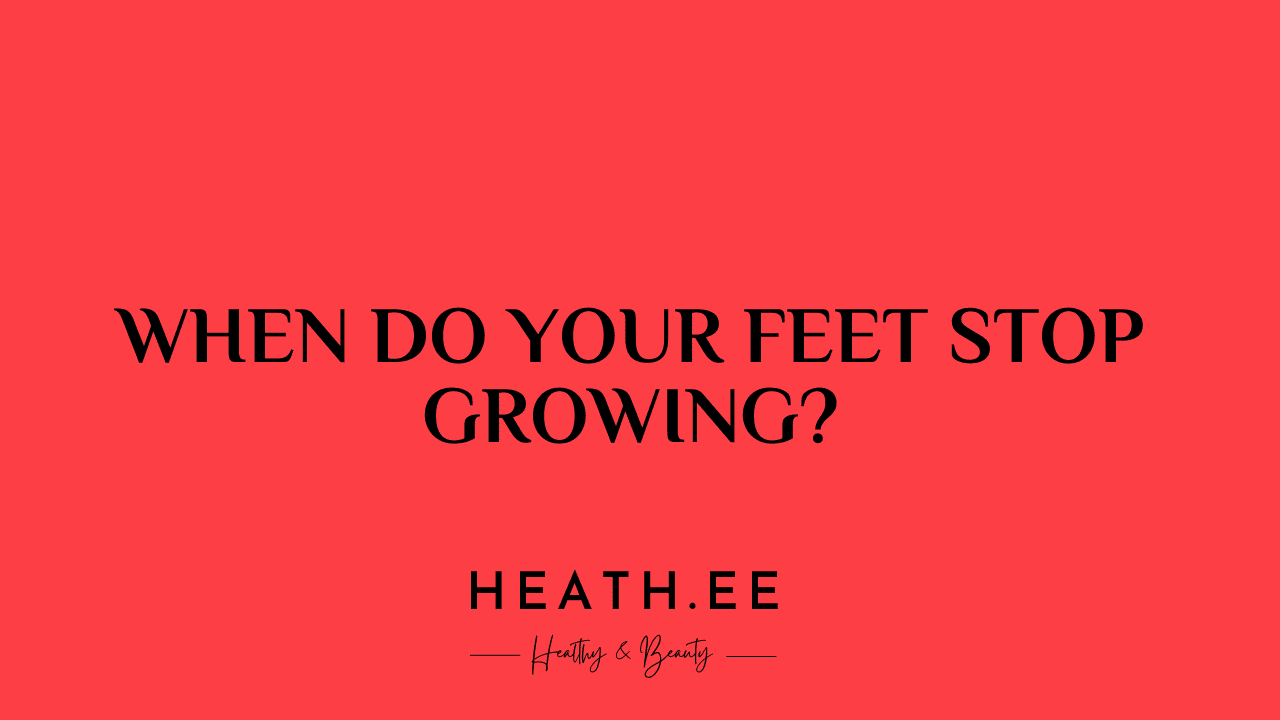Feet are one of the most important parts of the human body. They provide us with balance and mobility, allowing us to move around and explore the world. But when do our feet stop growing?
In this blog post, we’ll explore the answer to this question and delve into what factors can influence how quickly our feet stop growing. We’ll also look at how to take care of your feet and keep them healthy. So, let’s get started!
What Age Do Feet Stop Growing?
On average, feet stop growing by the age of 18. However, this can vary depending on individual factors, such as gender and genetics. For example, men are likely to have larger feet than women, and some people may have feet that grow faster or slower than others.

How Do Feet Grow?
Feet grow in a similar way to other parts of the body. As we grow, our bones, muscles, and tendons all get bigger. This is due to the production of hormones, such as growth hormone and testosterone, which stimulate growth.
The bones in our feet, known as the metatarsals, are particularly important for foot growth. As we age, the metatarsals can become thicker and longer, resulting in larger feet.
What Factors Affect Foot Growth?
As mentioned, there are a number of factors that can influence how quickly our feet stop growing. These include:
-
Gender: Men tend to have larger feet than women, and their feet may continue to grow for longer.
-
Genetics: Our genetics can affect how quickly our feet stop growing. If one or both of your parents have large feet, it’s likely that you will too.
-
Hormones: Hormones, such as growth hormone and testosterone, can influence how quickly our feet stop growing.
-
Nutrition: Eating a balanced diet can help ensure that the body has enough nutrients to support foot growth.
-
Activity Level: Regular physical activity can help promote foot growth, as it encourages the production of hormones that can stimulate growth.

How Can You Take Care of Your Feet?
It’s important to take care of your feet, even after they’ve stopped growing. Here are some tips for keeping your feet healthy:
-
Wear the Right Shoes: Wearing shoes that fit properly can help prevent injury and ensure that your feet are comfortable.
-
Keep Your Feet Clean: Washing your feet regularly can help keep them free of bacteria and other germs.
-
Exercise Regularly: Regular exercise can help keep your feet strong and flexible.
-
Stretch Your Feet: Stretching your feet can help keep them flexible and reduce the risk of injury.
-
See a Podiatrist: Seeing a podiatrist regularly can help identify any potential problems and keep your feet healthy.
What Are Some Common Foot Problems?
There are a number of common foot problems that can affect people of all ages. These include:
-
Blisters: Blisters are small, fluid-filled bumps that can form on the feet. They can be caused by friction from shoes that don’t fit properly.
-
Athlete’s Foot: Athlete’s foot is a fungal infection that can cause itching, burning, and redness. It’s often caused by wearing damp shoes or socks.
-
Bunions: Bunions are bony bumps that can form on the side of the foot. They can be caused by wearing shoes that are too tight or by an underlying medical condition.
-
Ingrown Toenails: Ingrown toenails occur when the edge of the toenail grows into the skin. They can be caused by wearing shoes that are too tight or by cutting the toenails too short.
When Should You See a Doctor?
If you’re experiencing any foot pain or discomfort, it’s important to see a doctor. A doctor can diagnose any underlying issues and recommend treatments.
It’s also important to see a doctor if you’re experiencing any of the following symptoms:
-
Redness: Redness on the feet can be a sign of an infection.
-
Swelling: Swelling of the feet can be a sign of an injury or medical condition.
-
Pain: Pain in the feet can be a sign of an injury or medical condition.
-
Limping: Limping can be a sign of an injury or medical condition.
Conclusion
Feet stop growing by the age of 18, on average. However, this can vary depending on individual factors, such as gender and genetics. It’s important to take care of your feet, even after they’ve stopped growing. Wearing shoes that fit properly, washing your feet regularly, exercising regularly, and stretching your feet can all help keep your feet healthy. If you’re experiencing any foot pain or discomfort, it’s important to see a doctor.
We hope this blog post has answered your question, “When do your feet stop growing?” Thanks for reading!



